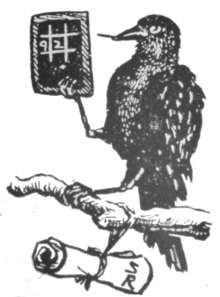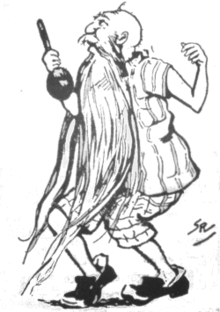HaJaBaRaLa
HaJaBaRaLa (Bengali: হ য ব র ল), or HJBRL: A Nonsense Story, is a children's novella by Sukumar Ray.[1] Ha Ja Ba Ra La is considered one of the best nonsense stories of Bengali literature. To highlight its genre, artistic merit and style, it is frequently compared to Alice In Wonderland.[2]
| HaJaBaRaLa (হ য ব র ল) | |
|---|---|
| Author | Sukumar Ray |
| Country | India |
| Language | Bengali |
| Genre(s) | Novella |
| Publisher | 1st : U.Roy and Sons 2nd : Signet Press |
| Publication date | 1921 |
Plot
The story starts with a child, the narrator, suddenly waking up from sleep and finding that the handkerchief they had placed just beside them before sleeping has turned into a cat. The child starts talking to the cat, who speaks nonsensically about a handkerchief before disappearing over the hedge. Then the child finds Kakeshwar doing mathematical calculations on a slate, that appears very unusual to the narrator.

This includes multiplication that is purely illogical and fallacious. After arguing over math, a goat appears and narrates his life about eating paper and other artificial things. Hijibijbij appears and laughs hysterically at improbable situations and keeps changing his mind about the names of his family members. Then many animals appear, and confusion results. The child wakes up from their odd dream and finds the cat, which does not talk.
Characters
Most of the characters have found idiomatic usage in Bengali language, which is true for many of Ray's works.
Some of the main characters are:

- Shree Kakkeshwar kuchkuche (Bengali: শ্রী কাক্কেশ্বর কুচকুচে)
- A raven/crow who wears a clerk's green eyeshade while performing mathematics.
- Gechhodada (Bengali: গেছোদাদা)
- A character that is only alluded to by the cat but never appears in the story. he is completely unpredictable, and according to the cat, can only be found solving a very complicated, irrational and nonsensical mathematics, which depends on many probabilities about where Gechodada can be that moment.
- Hijibijbij (Bengali: হিজিবিজবিজ)
- A person who imagines very improbable situations and laughs at them.
- Sheyal
- The fox and the advocate against Kumir
- Byakaran Shing BA Khadyabisharad (Bengali: ব্যাকরণ শিং বি,এ,খাদ্যবিশারদ)
- A goat who delivers academic lectures on non-academic subjects, such as what goats do not eat.
- Pyancha
- The owl judge in the court

- Udhho and Budhho (Bengali: উধো আর বুধো)
- dwarf-like creatures who are fighting one moment and hugging the next. The phrase "Udhor pindi Budhor ghare", meaning (but not literally translated to) "the shoe is on the other foot", has become a very common idiom.
- Shojaru
- A porcupine who makes a court case for insult
- Kumir
- A crocodile, the advocate of Shojaru
- Chondrobindu
- A nonsense cat who speaks about nonsense things like gechodada (grandpa tree) and other people.
- Nera (Bengali: নেড়া)
- A person who has no hair. He loves to sing nonsense songs.
- Gechhoboudi
- Who dos not appear in the story but is the wife of gechhodada who cooks
- Mejomama
- Maternal uncle who finds everything about the story nonsense.
References
- Lesley D. Clement; Leyli Jamali (30 July 2015). Global Perspectives on Death in Children’s Literature. Taylor & Francis. pp. 164–. ISBN 978-1-317-59948-7.
- "Sukumar Ray Breaking ground with literary nonsense". The Daily Star. 2010-10-30. Retrieved 2020-05-10.
External links
- Wikisource page (in Bengali), illustrated
- Transcript of HaJaBaRaLa (in Bengali)